奥巴马教育演讲原文
奥巴马总统9月8日开学演讲(中英文对照)
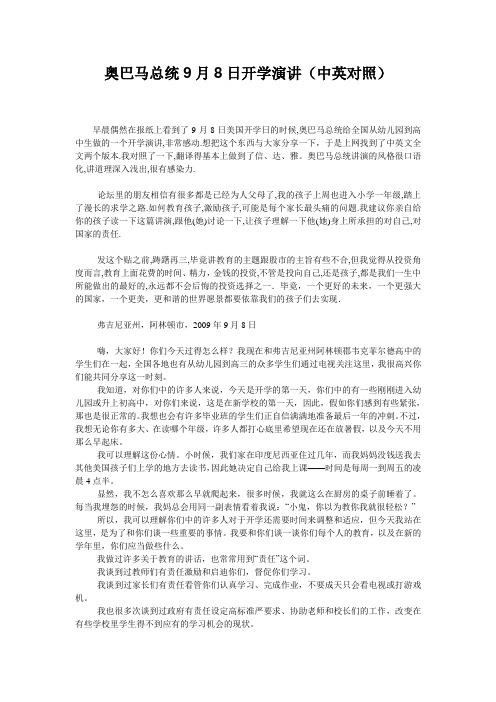
奥巴马总统9月8日开学演讲(中英对照)早晨偶然在报纸上看到了9月8日美国开学日的时候,奥巴马总统给全国从幼儿园到高中生做的一个开学演讲,非常感动.想把这个东西与大家分享一下,于是上网找到了中英文全文两个版本.我对照了一下,翻译得基本上做到了信、达、雅。
奥巴马总统讲演的风格很口语化,讲道理深入浅出,很有感染力.论坛里的朋友相信有很多都是已经为人父母了,我的孩子上周也进入小学一年级,踏上了漫长的求学之路.如何教育孩子,激励孩子,可能是每个家长最头痛的问题.我建议你亲自给你的孩子读一下这篇讲演,跟他(她)讨论一下,让孩子理解一下他(她)身上所承担的对自己,对国家的责任.发这个贴之前,踌躇再三,毕竟讲教育的主题跟股市的主旨有些不合,但我觉得从投资角度而言,教育上面花费的时间、精力,金钱的投资,不管是投向自己,还是孩子,都是我们一生中所能做出的最好的,永远都不会后悔的投资选择之一.毕竟,一个更好的未来,一个更强大的国家,一个更美,更和谐的世界愿景都要依靠我们的孩子们去实现.弗吉尼亚州,阿林顿市,2009年9月8日嗨,大家好!你们今天过得怎么样?我现在和弗吉尼亚州阿林顿郡韦克菲尔德高中的学生们在一起,全国各地也有从幼儿园到高三的众多学生们通过电视关注这里,我很高兴你们能共同分享这一时刻。
我知道,对你们中的许多人来说,今天是开学的第一天,你们中的有一些刚刚进入幼儿园或升上初高中,对你们来说,这是在新学校的第一天,因此,假如你们感到有些紧张,那也是很正常的。
我想也会有许多毕业班的学生们正自信满满地准备最后一年的冲刺。
不过,我想无论你有多大、在读哪个年级,许多人都打心底里希望现在还在放暑假,以及今天不用那么早起床。
我可以理解这份心情。
小时候,我们家在印度尼西亚住过几年,而我妈妈没钱送我去其他美国孩子们上学的地方去读书,因此她决定自己给我上课——时间是每周一到周五的凌晨4点半。
显然,我不怎么喜欢那么早就爬起来,很多时候,我就这么在厨房的桌子前睡着了。
米歇尔奥巴马演讲稿
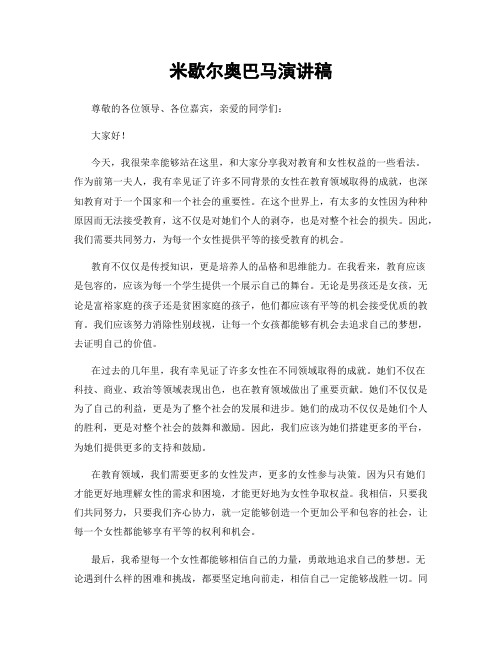
米歇尔奥巴马演讲稿尊敬的各位领导、各位嘉宾,亲爱的同学们:大家好!今天,我很荣幸能够站在这里,和大家分享我对教育和女性权益的一些看法。
作为前第一夫人,我有幸见证了许多不同背景的女性在教育领域取得的成就,也深知教育对于一个国家和一个社会的重要性。
在这个世界上,有太多的女性因为种种原因而无法接受教育,这不仅是对她们个人的剥夺,也是对整个社会的损失。
因此,我们需要共同努力,为每一个女性提供平等的接受教育的机会。
教育不仅仅是传授知识,更是培养人的品格和思维能力。
在我看来,教育应该是包容的,应该为每一个学生提供一个展示自己的舞台。
无论是男孩还是女孩,无论是富裕家庭的孩子还是贫困家庭的孩子,他们都应该有平等的机会接受优质的教育。
我们应该努力消除性别歧视,让每一个女孩都能够有机会去追求自己的梦想,去证明自己的价值。
在过去的几年里,我有幸见证了许多女性在不同领域取得的成就。
她们不仅在科技、商业、政治等领域表现出色,也在教育领域做出了重要贡献。
她们不仅仅是为了自己的利益,更是为了整个社会的发展和进步。
她们的成功不仅仅是她们个人的胜利,更是对整个社会的鼓舞和激励。
因此,我们应该为她们搭建更多的平台,为她们提供更多的支持和鼓励。
在教育领域,我们需要更多的女性发声,更多的女性参与决策。
因为只有她们才能更好地理解女性的需求和困境,才能更好地为女性争取权益。
我相信,只要我们共同努力,只要我们齐心协力,就一定能够创造一个更加公平和包容的社会,让每一个女性都能够享有平等的权利和机会。
最后,我希望每一个女性都能够相信自己的力量,勇敢地追求自己的梦想。
无论遇到什么样的困难和挑战,都要坚定地向前走,相信自己一定能够战胜一切。
同时,我也希望每一个男性都能够尊重和支持女性,让我们共同努力,创造一个更加美好的未来。
谢谢大家!。
奥巴马关于不让孩子落后的演讲
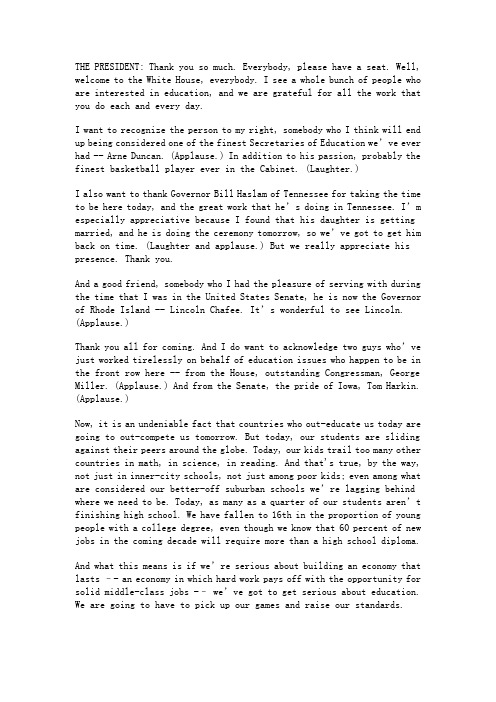
THE PRESIDENT: Thank you so much. Everybody, please have a seat. Well, welcome to the White House, everybody. I see a whole bunch of people who are interested in education, and we are grateful for all the work that you do each and every day.I want to recognize the person to my right, somebody who I think will end up being considered one of the finest Secretaries of Education we’ve ever had -- Arne Duncan. (Applause.) In addition to his passion, probably the finest basketball player ever in the Cabinet. (Laughter.)I also want to thank Governor Bill Haslam of Tennessee for taking the time to be here today, and the great work that he’s doing in Tennessee. I’m especially appreciative because I found that his daughter is getting married, and he is doing the cer emony tomorrow, so we’ve got to get him back on time. (Laughter and applause.) But we really appreciate his presence. Thank you.And a good friend, somebody who I had the pleasure of serving with during the time that I was in the United States Senate, he is now the Governor of Rhode Island -- Lincoln Chafee. It’s wonderful to see Lincoln. (Applause.)Thank you all for coming. And I do want to acknowledge two guys who’ve just worked tirelessly on behalf of education issues who happen to be in the front row here -- from the House, outstanding Congressman, George Miller. (Applause.) And from the Senate, the pride of Iowa, Tom Harkin. (Applause.)Now, it is an undeniable fact that countries who out-educate us today are going to out-compete us tomorrow. But today, our students are sliding against their peers around the globe. Today, our kids trail too many other countries in math, in science, in reading. And that's true, by the way, not just in inner-city schools, not just among poor kids; even among what are considered our better-off suburban schools we’re lagging behind where we need to be. Today, as many as a quarter of our students aren’t finishing high school. We have fallen to 16th in the proportion of young people with a college degree, even though we know that 60 percent of new jobs in the coming decade will require more than a high school diploma.And what this means is if we’re serious about building an economy that lasts –- an economy in which hard work pays off with the opportunity for solid middle-class jobs -–we’ve got to get serious about education. We are going to have to pick up our games and raise our standards.We’re in the midst of an ongoing enormous economic challenge. And I spend a lot of my time thinking immediately about how we can put folks back to work and how we can stabilize the world financial markets. And those things are all important. But the economic challenges we face now are economic challenges that have been building for decades now, and the most important thing we can do is to make sure that our kids are prepared for this new economy. That’s the single-most important thing we can do. (Applause.) So even as we focus on the near term and what we’ve got to do to put folks back to work, we’ve got to be thinking a little bit ahead and start making the tough decisions now to make sure that our schools are working the way they need to work.Now, we all now that schools can’t do it alone. As parents, the task begins at home. It begins by turning off the TV and helping with homework, and en couraging a love of learning from the very start of our children’s lives. And I’m speaking from experience now. (Laughter.) Malia and Sasha would often rather be watching American Idol or Sponge Bob, but Michelle and I know that our first job, our first responsibility, is instilling a sense of learning, a sense of a love of learning in our kids. And so there are no shortcuts there; we have to do that job. And we can’t just blame teachers and schools if we’re not instilling that commitment, that dedication to learning, in our kids.But as a nation, we also have an obligation to make sure that all of our children have the resources they need to learn, because they’re spending a lot of time outside of the household. They’re spending the bulk of their waking hou rs in school. And that means that we’ve got to make sure we’ve got quality schools, good teachers, the latest textbooks, the right technology. And that, by the way, is something we can do something about right away. That’s why I sent the jobs bill to Congr ess that would put thousands of teachers back to work all across the country and modernize at least 35,000 schools. (Applause.)Congress should pass that bill right now. We've got too many schools that are under-resourced, too many teachers who want to be in the classroom who aren’t because of budget constraints, not because they can’t do the job.So parents have a role and schools need more resources. But money alone won’t solve our education problems. I’ve said this before, I will repeat it: Money alone i s not enough. We also need reform. We’ve got to make sure that every classroom is a place of high expectations and high performance. And that’s been our vision since taking office. That’s why instead of just pouring money into the system that’s not working, we launched a competition called Race to the Top. And to all 50 states --to governors, to schools districts -- we said, show us the most innovative plans to improve teacher quality and student achievement; we’ll show you the money. We want to provide yo u more resources, but there’s also got to be a commitment on your part to make the changes that are necessary so that we can see actual results.And for less than 1 percent of what we spend on education each year, Race to the Top, under Arne’s leadership, has led states across the country to raise their standards for teaching and learning. And, by the way, these standards that we’re talking about -- these high standards that we’re talking about were not developed here in Washington. They were developed by Republican and Democratic governors throughout the country -- essentially as a peer group, a peer review system where everybody traded best practices and said, here’s what seems to work, and let’s hold all of our schools to these high standards. And since that Race to the Top has been launched, we’ve seen what’s possible when reform isn’t just a top-down mandate but the work of local teachers and principals and school boards and communities working together to develop better standards.This is why, in my State of the Union address this year, I said that Congress should reform the No Child Left Behind law based on the principles that have guided Race to the Top.And I want to say the goals behind No Child Left Behind were admirable, and President Bush deserves credit for that. Higher standards are the right goal. Accountability is the right goal. Closing the achievement gap is the right goal. And we’ve got to stay focused on those goals. But experience has taught us that, in it’s implementation, No Child Left Behind had some serious flaws that are hurting our children instead of helping them. Teachers too often are being forced to teach to the test. Subjects like history and science have been squeezed out. And in order to avoid having their schools labeled as failures, some states, perversely, have actually had to lower their standards in a race to the bottom instead of a Race to the Top. They don't want to get penalized? Let’s make sure that the standards are so low that we’re not going to be seen failing to meet them. That makes no sense.And these problems have been obvious to parents and educators all over the country for years now. Despite the good intentions of some -- two of them are sitting right here, Tom and George -- Congress has not been able to fix th ese flaws so far. I’ve urged Congress for a while now, let’s get a bipartisan effort, let’s fix this. Congress hasn’t been able to do it. So I will. Our kids only get one shot at a decent education. They cannot afford to wait any longer. So, given that Congress cannot act, I am acting. (Applause.)So starting today, we’ll be giving states more flexibility to meet high standards. Keep in mind, the change we’re making is not lowering standards; we’re saying we’re going to give you more flexibility to meet hig h standards. We’re going to let states, schools and teachers come up with innovative ways to give our children the skills they need to compete for the jobs of the future. Because what works in Rhode Island may not be the same thing that works in Tennessee -– but every student should have the same opportunity to learn and grow, no matter what state they live in.Let me repeat: This does not mean that states will be able to lower their standards or escape accountability. In fact, the way we’ve structured this, if states want more flexibility, they’re going to have to set higher standards, more honest standards, that prove they’re serious about meeting them.And already, 44 states –- led by some of the people on this stage –- have set higher standards and proposed new ways to get there -- because that’s what’s critical. They know what’s at stake here.Ricky Hall is the principal of a charter school in Worcester, Massachusetts. Where’s Ricky? Oh, Ricky’s not here. (Laughter.) He was -- there he is. Ricky -- I was n’t sure if he was behind me. Good. Thank you. (Applause.) Every single student who graduated from Ricky’s school in the last three years went on to college. Every single one. (Applause.) His school ranks in the top quarter of all schools in Massachusetts -- and as you know, Massachusetts’ schools rank very high among the 50 states. But because Ricky’s school did not meet all the technical standards of No Child Left Behind, his school was labeled a failure last year. That’s not right. That needs to change. What we’re doing today will encourage the progress at schools like Ricky’s.Is John Becker here? He is? All right, here’s John. (Laughter.) I didn't think you were John. (Laughter.) John teaches at one of thehighest-performing middle schools in D.C., and now with these changes we’re making he’s going to be able to focus on teaching his 4th-graders math in a way that improves their performance instead of just teaching to a test. (Applause.)We have superintendents like David Estrop from Springfield, Ohio -- right here. (Applause.) Dave will be able to focus on improving teaching and learning in his district instead of spending all his time on bureaucratic mandates from Washington that don’t actually produce results.So this isn’t just the right thing to do f or our kids -–it’s the right thing to do for our country. We can’t afford to wait for an education system that is not doing everything it needs to do for our kids. We can’t let another generation of young people fall behind because we didn’t have the cour age to recognize what doesn’t work, admit it, and replace it with something that does. We’ve got to act now. (Applause.) We’ve got to act now and harness all the good ideas coming out of our states, out of our schools. We can't be tied up with ideology. We can't be worrying about partisanship. We just have to make sure that we figure out what works, and we hold ourselves to those high standards. Because now is the time to give our children the skills that they need to compete in this global economy.We’ve g ot a couple of students up on stage who are doing outstanding work because somebody in their schools is dedicated and committed every single day to making sure that they’ve got a chance to succeed. But I don't want them to be the exception. I want them to be the rule. Now is the time to make our education system the best in the world, the envy of the world. (Applause.) It used to be. It is going to be again, thanks to the people in this room.God bless you. God bless the United States of America.Thank you. (Applause.)。
奥巴马关于教育的演讲
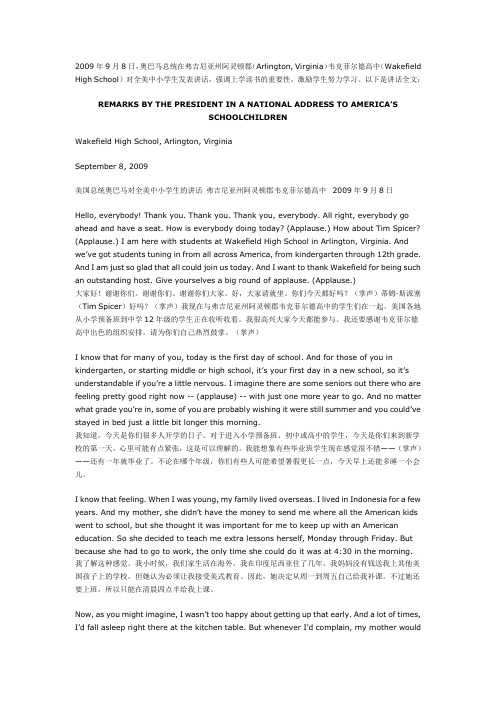
2009年9月8日,奥巴马总统在弗吉尼亚州阿灵顿郡(Arlington, Virginia)韦克菲尔德高中(Wakefield High School)对全美中小学生发表讲话,强调上学读书的重要性,激励学生努力学习。
以下是讲话全文:REMARKS BY THE PRESIDENT IN A NATIONAL ADDRESS TO AMERICA’SSCHOOLCHILDRENWakefield High School, Arlington, VirginiaSeptember 8, 2009美国总统奥巴马对全美中小学生的讲话弗吉尼亚州阿灵顿郡韦克菲尔德高中2009年9月8日Hello, everybody! Thank you. Thank you. Thank you, everybody. All right, everybody go ahead and have a seat. How is everybody doing today? (Applause.) How about Tim Spicer? (Applause.) I am here with students at Wakefield High School in Arlington, Virginia. And we’ve got students tuning in from all across America, from kindergarten through 12th grade. And I am just so glad that all could join us today. And I want to thank Wakefield for being such an outstanding host. Give yourselves a big round of applause. (Applause.)大家好!谢谢你们。
奥巴马演讲——Why should we go to school?

Speech:Why should we go to school?Hello, everybody! Thank you. Thank you. Thank you, everybody. All right, everybody go ahead and have a seat. How is everybody doing today? (Applause.) How about Tim Spicer? (Applause.) I am here with students at Wakefield High School in Arlington, Virginia. And we’ve got students tuning in from all across America, from kindergarten through 12th grade. And I am just so glad that all could join us today. And I want to thank Wakefield for being such an outstanding host. Give yourselves a big round of applause. (Applause.) 嗨,大家好!你们今天过得怎么样?我现在和弗吉尼亚州阿林顿郡韦克菲尔德高中的学生们在一起,全国各地也有从幼儿园到高三的众多学生们通过电视关注这里,我很高兴你们能共同分享这一时刻。
I know that for many of you, today is the first day of school. And for those of you in kindergarten, or starting middle or high school, it’s your first day in a new school, so it’s understandable if you’re a little nervous. I imagine there are some seniors out there who are feeling pretty good right now -- (applause) -- with just one more year to go. And no matter what grade you’re in, some of you are probably wishing it were still summer and you could’ve stayed in bed just a little bit longer this morning.我知道,对你们中的许多人来说,今天是开学的第一天,你们中的有一些刚刚进入幼儿园或升上初高中,对你们来说,这是在新学校的第一天,因此,假如你们感到有些紧张,那也是很正常的。
奥巴马总统9月8日开学演讲(中英文对照)
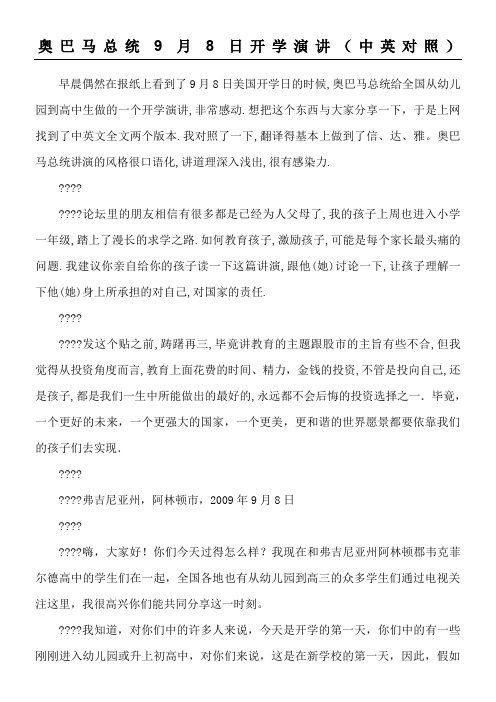
奥巴马总统9月8日开学演讲(中英对照)早晨偶然在报纸上看到了9月8日美国开学日的时候,奥巴马总统给全国从幼儿园到高中生做的一个开学演讲,非常感动.想把这个东西与大家分享一下,于是上网找到了中英文全文两个版本.我对照了一下,翻译得基本上做到了信、达、雅。
奥巴马总统讲演的风格很口语化,讲道理深入浅出,很有感染力.????????论坛里的朋友相信有很多都是已经为人父母了,我的孩子上周也进入小学一年级,踏上了漫长的求学之路.如何教育孩子,激励孩子,可能是每个家长最头痛的问题.我建议你亲自给你的孩子读一下这篇讲演,跟他(她)讨论一下,让孩子理解一下他(她)身上所承担的对自己,对国家的责任.????????发这个贴之前,踌躇再三,毕竟讲教育的主题跟股市的主旨有些不合,但我觉得从投资角度而言,教育上面花费的时间、精力,金钱的投资,不管是投向自己,还是孩子,都是我们一生中所能做出的最好的,永远都不会后悔的投资选择之一.毕竟,一个更好的未来,一个更强大的国家,一个更美,更和谐的世界愿景都要依靠我们的孩子们去实现.????????弗吉尼亚州,阿林顿市,2009年9月8日????????嗨,大家好!你们今天过得怎么样?我现在和弗吉尼亚州阿林顿郡韦克菲尔德高中的学生们在一起,全国各地也有从幼儿园到高三的众多学生们通过电视关注这里,我很高兴你们能共同分享这一时刻。
????我知道,对你们中的许多人来说,今天是开学的第一天,你们中的有一些刚刚进入幼儿园或升上初高中,对你们来说,这是在新学校的第一天,因此,假如你们感到有些紧张,那也是很正常的。
我想也会有许多毕业班的学生们正自信满满地准备最后一年的冲刺。
不过,我想无论你有多大、在读哪个年级,许多人都打心底里希望现在还在放暑假,以及今天不用那么早起床。
????我可以理解这份心情。
小时候,我们家在印度尼西亚住过几年,而我妈妈没钱送我去其他美国孩子们上学的地方去读书,因此她决定自己给我上课——时间是每周一到周五的凌晨4点半。
奥巴马在开学第一课上的演讲词(中文)
奥巴马在开学第一课上的演讲词(中文转)大家好!谢谢你们。
谢谢你们。
谢谢你们大家。
好,大家请就坐。
你们今天都好吗?(掌声)蒂姆•斯派塞(Tim Spicer)好吗?(掌声)我现在与弗吉尼亚州阿灵顿郡韦克菲尔德高中的学生们在一起。
美国各地从小学预备班到中学12年级的学生正在收听收看。
我很高兴大家今天都能参与。
我还要感谢韦克菲尔德高中出色的组织安排。
请为你们自己热烈鼓掌。
(掌声)我知道,今天是你们很多人开学的日子。
对于进入小学预备班、初中或高中的学生,今天是你们来到新学校的第一天,心里可能有点紧张,这是可以理解的。
我能想象有些毕业班学生现在感觉很不错——(掌声)——还有一年就毕业了。
不论在哪个年级,你们有些人可能希望暑假更长一点,今天早上还能多睡一小会儿。
我了解这种感觉。
我小时候,我们家生活在海外。
我在印度尼西亚住了几年。
我妈妈没有钱送我上其他美国孩子上的学校,但她认为必须让我接受美式教育。
因此,她决定从周一到周五自己给我补课。
不过她还要上班,所以只能在清晨四点半给我上课。
你们可以想见,我不太情愿那么早起床。
有很多次,我趴在餐桌上就睡着了。
但每当我抱怨的时候,我妈妈都会那样地看我一眼,然后说:“小子,这对我也并不轻松。
”(笑声)我知道你们有些人还在适应开学后的生活。
但我今天来到这里是因为有重要的事情要和你们说。
我来这里是要和你们谈谈你们的教育问题,以及在这个新学年对你们所有人的期望。
我做过很多次有关教育问题的演讲。
我多次谈到过责任问题。
我谈到过教师激励学生并督促他们学习的责任。
我谈到过家长的责任,要确保你们走正路,完成家庭作业,不要整天坐在电视前或玩Xbox游戏。
我多次谈到过政府的责任,要制定高标准,支持教师和校长的工作,彻底改善不能为学生提供应有机会的、教育质量差的学校。
奥巴马演讲稿(精选5篇)_演讲稿完美版
《奥巴马演讲稿》奥巴马演讲稿(一):MR. OBAMA: Thank you。
Thank you so much。
Vice President Biden,Mr. ChiefJustice, Members of the United States Congress, distinguished guests, and fellowcitizens:多谢,十分感谢大家。
拜登副总统、首席大法官先生、国会议员们、尊敬的各位嘉宾、亲爱的公民们。
Each time we gather to inaugurate a president, we bear witness to theenduring strength of our Constitution。
We affirm the promise of our democracy。
We recall that what binds this nation together is not the colors of our skin orthe tenets of our faith or the origins of our names。
What makes us exceptionalwhat makes us American is our allegiance to an idea,articulated in adeclaration made more than two centuries ago:每一次我们集会庆祝总统就职都是在见证美国宪法的持久力量。
我们都是在肯定美国民主的承诺。
我们重申,将这个国家紧密联系在一齐的不是我们的肤色,也不是我们信仰的教条,更不是我们名字的来源。
让我们与众不一样,让我们成为美国人的是我们对于一种理念的恪守。
200多年前,这一理念在一篇宣言中被清晰阐述:We hold these truths to be self-evident, that all men are created equal,that they are endowed by their Creator with certain unalienable rights, thatamong these are Life, Liberty, and the pursuit of Happiness。
奥巴马教育演讲
奥巴马教育演讲奥巴马在2012年的演讲中说到:"在一个尊重每个人努力的新世纪,我们必须更投入于教育,使每个学生有机会取得成功,从过去几十年来看,我们面临着一个重大挑战:我们需要更有效地教育出有创造性和活力的一代,为之奠定坚实的基础,让他们有机会去探索未知的景象,追求他们的梦想,使我们的下一代紧跟时代的步伐。
那么,我们该如何做呢?首先,我们需要确保我们的孩子从一开始就有机会获得充足的资源和最好的教育。
这意味着把健全的教育优先放在国家规划中,充分融入经济增长和就业策略等,将投入经费转移到学校,让素质好的老师走入教室。
这就是为什么我们需要一个出色的老师,一所优秀的学校。
其次,我们要让学生有更多发展机会,以提高他们的技能和素养水平。
我们需要为我们的孩子建立足够的机会,使他们获得参与实践教育、夏令营、学校实习、正式雇佣或实习机会的能力。
这些都可以激发他们的创造力,同时可以支持给我们的社会带来新的活力。
第三,我们需要确保我们的孩子有机会发展基本能力,以便将来参与社会。
我们需要让学生可以获得更多样化的课程,接受跨学科的教育,获得有关语言、科学、技术的知识,并了解世界各个地区的历史、文化。
最后,我们要建立一个有动力的新世纪教育系统,让学生拥有更多机会提升自己。
这意味着在学校和在第三方机构提供更多的认证课程,使每一位学生都能真正有效地参与和学习,走出去,在丰富多彩的世界里发现更多的机会,并做出更多改变。
奥巴马总统在2010年6月致辞中说:"这将会是一个新时代,新世纪的教育,它将会给每一个孩子以新的力量、新的可能,改变未来。
让我们一起努力,让每个学子有机会取得成功,打开他们的未来,让每个家庭有机会实现梦想,让更多的家庭享受着幸福美满。
」在这个世界变化迅速的今天,教育不仅仅是一种传播知识的手段,更是一种培养全人的能力,帮助学生获得技能、开发品质,实现其人生价值的手段。
只有拥有更多的教育机会,才能激发我们的发现精神,改变未来的蓝图,创建一个更加平等的社会。
奥巴马演讲《我们为什么要上学》全文
弗吉尼亚州,阿林顿市,2009年9月8日嗨,大家好!你们今天过得怎么样?我现在和弗吉尼亚州阿林顿郡韦克菲尔德高中的学生们在一起,全国各地也有从幼儿园到高三的众多学生们通过电视关注这里,我很高兴你们能共同分享这一时刻。
我知道对于你们中的许多人而言,今天是新学期的开始,尤其是初入园、初入校的新生,更是你们在新环境中的第一天,难免会有些小小紧张。
还可以想象有些即将面临毕业的高年级生,现在的感觉一定不错。
当然不管你是几年级,有些同学可能还希望现在继续处在暑假中,可以睡懒觉。
能理解这种想法。
当我还是个孩子的时候,在印度尼西亚住了几年。
我的母亲没钱送我去当地都是美国孩子上的学校,但她认为让我紧跟美国教育是很重要的,于是由她自己教我。
从星期一到星期五,但是因为她必须工作,能教我的时间也就只能是在凌晨4点半。
你们可以想象,早起不是件乐意的事。
很多时候,在餐桌边,我就睡着了。
但是每当我抱怨时,母亲就只是给我一本书,然后说:“伙计,我也没空去野餐。
”有些人仍在调整心态以适应新的学习生活,之所以我今天在这里,是有些非常重要的话想要告诉你们,有关教育和对新学期的期望。
迄今为止,我作过很多有关教育的演讲,也多次提到了社会责任性。
我提到过教师的责任是鼓励学生和促进他们学习。
父母的责任是确保你做你该做的事,完成你的作业,而不是把所有空闲时间都用来看电视或玩xbox。
政府的责任是建立好标准,支持教师和校长的工作,扶持那些较弱的学校,让失学的孩子得到他们应有的。
但是退一万步讲,除非你们完成了你们的责任,除非你们关注那些学校,除非你们注意到那些老师,除非你们听从父母,祖辈或是那些通过努力获得成功的长辈,否则即使我们拥有世界上最杰出的师资,最有支持力的家长,最好的学校,一切都不会有所不同。
这就是我今天的讲话核心,你们每个人对教育的责任。
我想从你们每个人对自己的责任讲起。
每个人都有擅长的事情,每个人都能贡献些什么。
所以你有责任发现自己的长处是什么,而学习就提供了这样一个发挥的机会。
- 1、下载文档前请自行甄别文档内容的完整性,平台不提供额外的编辑、内容补充、找答案等附加服务。
- 2、"仅部分预览"的文档,不可在线预览部分如存在完整性等问题,可反馈申请退款(可完整预览的文档不适用该条件!)。
- 3、如文档侵犯您的权益,请联系客服反馈,我们会尽快为您处理(人工客服工作时间:9:00-18:30)。
my education,my future--obmaTHE PRESIDENT: Hello, everybody! Thank you. Thank you. Thank you, everybody. All right, everybody go ahead and have a seat. How is everybody doing today? (Applause.) How about Tim Spicer? (Applause.) I am here with students at Wakefield High School in Arlington, Virginia. And we've got students tuning in from all across America, from kindergarten through 12th grade. And I am just so glad that all could join us today. And I want to thank Wakefield for being such an outstanding host. Give yourselves a big round of applause. (Applause.)I know that for many of you, today is the first day of school. And for those of you in kindergarten, or starting middle or high school, it's your first day in a new school, so it's understandable if you're a little nervous. I imagine there are some seniors out there who are feeling pretty good right now -- (applause) -- with just one more year to go. And no matter what grade you'rein, some of you are probably wishing it were still summer and you could've stayed in bed just a little bit longer this morning.I know that feeling. When I was young, my family lived overseas. I lived in Indonesia for a few years. And my mother, she didn't have the money to send me where all the American kids went to school, but she thought it was important for me to keep up with an American education. So she decided to teach me extra lessons herself, Monday through Friday. But because she had to go to work, the only time she could do it was at 4:30 in the morning.Now, as you might imagine, I wasn't too happy about getting up that early. And a lot of times, I'd fall asleep right there at the kitchen table. But whenever I'd complain, my mother would just give me one of those looks and she'd say, "This is no picnic for me either, buster." (Laughter.)So I know that some of you are still adjusting to being back at school. But I'm here today because I have something important to discuss with you. I'm here because I want to talk with you about your education and what's expected of all of you in this new school year.Now, I've given a lot of speeches about education. And I've talked about responsibility a lot.I've talked about teachers' responsibility for inspiring students and pushing you to learn.I've talked about your parents' responsibility for making sure you stay on track, and you get your homework done, and don't spend every waking hour in front of the TV or with the Xbox.I've talked a lot about your government's responsibility for setting high standards, and supporting teachers and principals, and turning aroundschools that aren't working, where students aren't getting the opportunities that they deserve.But at the end of the day, we can have the most dedicated teachers, the most supportive parents, the best schools in the world -- and none of it will make a difference, none of it will matter unless all of you fulfill your responsibilities, unless you show up to those schools, unless you pay attention to those teachers, unless you listen to your parents and grandparents and other adults and put in the hard work it takes to succeed. That's what I want to focus on today: the responsibility each of you has for your education.I want to start with the responsibility you have to yourself. Every single one of you has something that you're good at. Every single one of you has something to offer. And you have a responsibility to yourself to discover what that is. That's the opportunity an education can provide.Maybe you could be a great writer -- maybe even good enough to write a book or articles in a newspaper -- but you might not know it until you write that English paper -- that English class paper that's assigned to you. Maybe you could be an innovator or an inventor -- maybe even good enough to come up with the next iPhone or the new medicine or vaccine -- but you might not know it until you do your project for your science class. Maybe you could be a mayor or a senator or a Supreme Court justice -- but you might not know that until you join student government or the debate team.And no matter what you want to do with your life, I guarantee that you'll need an education to do it. You want to be a doctor, or a teacher, or a police officer? You want to be a nurse or an architect, a lawyer or a member of our military? You're going to need a good education for every single one of those careers. You cannot drop out of school and just drop into a good job. You've got to train for it and work for it and learn for it.And this isn't just important for your own life and your own future. What you make of your education will decide nothing less than the future of this country. The future of America depends on you. What you're learning in school today will determine whether we as a nation can meet our greatest challenges in the future.You'll need the knowledge and problem-solving skills you learn in science and math to cure diseases like cancer and AIDS, and to develop new energy technologies and protect our environment. You'll need the insights and critical-thinking skills you gain in history and social studies to fight poverty and homelessness, crime and discrimination, and make our nation more fair and more free. You'll need the creativity and ingenuity you develop in all your classes to build new companies that will create new jobs and boost our economy.We need every single one of you to develop your talents and your skills and your intellect so you can help us old folks solve our most difficult problems. If you don't do that -- if you quit on school -- you're notjust quitting on yourself, you're quitting on your country.Now, I know it's not always easy to do well in school.I know a lot of you have challenges in your lives right now that can make it hard to focus on your schoolwork.I get it. I know what it's like. My father left my family when I was two years old, and I was raised by a single mom who had to work and who struggled at times to pay the bills and wasn't always able to give us the things that other kids had. There were times when I missed having a father in my life. There were times when I was lonely and I felt like I didn't fit in.So I wasn't always as focused as I should have been on school, and I did some things I'm not proud of, and I got in more trouble than I should have. And my life could have easily taken a turn for the worse.But I was -- I was lucky. I got a lot of second chances, and I had the opportunity to go to college and law schooland follow my dreams. My wife, our First Lady Michelle Obama, she has a similar story. Neither of her parents had gone to college, and they didn't have a lot of money. But they worked hard, and she worked hard, so that she could go to the best schools in this country.Some of you might not have those advantages. Maybe you don't have adults in your life who give you the support that you need. Maybe someone in your family has lost their job and there's not enough money to go around. Maybe you live in a neighborhood where you don't feel safe, or have friends who are pressuring you to do things you know aren't right.But at the end of the day, the circumstances of your life -- what you look like, where you come from, how much money you have, what you've got going on at home -- none of that is an excuse for neglecting your homework or having a bad attitude in school. That's no excuse for talking back to your teacher, or cutting class, or dropping out of school. There is no excuse for not trying.Where you are right now doesn't have to determine where you'll end up. No one's written your destiny for you, because here in America, you write your own destiny. You make your own future.That's what young people like you are doing every day, all across America.Young people like Jazmin Perez, from Roma, Texas. Jazmin didn't speak English when she first started school. Neither of her parents had gone to college. But she worked hard, earned good grades, and got a scholarship to Brown University -- is now in graduate school, studying public health, on her way to becoming Dr. Jazmin Perez.I'm thinking about Andoni Schultz, from Los Altos, California, who's fought brain cancer since he was three. He's had to endure all sorts of treatments and surgeries, one of which affected his memory, so it took him much longer -- hundreds of extra hours -- to do hisschoolwork. But he never fell behind. He's headed to college this fall.And then there's Shantell Steve, from my hometown of Chicago, Illinois. Even when bouncing from foster home to foster home in the toughest neighborhoods in the city, she managed to get a job at a local health care center, start a program to keep young people out of gangs, and she's on track to graduate high school with honors and go on to college.And Jazmin, Andoni, and Shantell aren't any different from any of you. They face challenges in their lives just like you do. In some cases they've got it a lot worse off than many of you. But they refused to give up. They chose to take responsibility for their lives, for their education, and set goals for themselves. And I expect all of you to do the same.That's why today I'm calling on each of you to set your own goals for your education -- and do everything you can to meet them. Your goal can be something as simpleas doing all your homework, paying attention in class, or spending some time each day reading a book. Maybe you'll decide to get involved in an extracurricular activity, or volunteer in your community. Maybe you'll decide to stand up for kids who are being teased or bullied because of who they are or how they look, because you believe, like I do, that all young people deserve a safe environment to study and learn. Maybe you'll decide to take better care of yourself so you can be more ready to learn. And along those lines, by the way, I hope all of you are washing your hands a lot, and that you stay home from school when you don't feel well, so we can keep people from getting the flu this fall and winter.But whatever you resolve to do, I want you to commit to it. I want you to really work at it.I know that sometimes you get that sense from TV that you can be rich and successful without any hard work -- that your ticket to success is through rapping orbasketball or being a reality TV star. Chances are you're not going to be any of those things.The truth is, being successful is hard. You won't love every subject that you study. You won't click with every teacher that you have. Not every homework assignment will seem completely relevant to your life right at this minute. And you won't necessarily succeed at everything the first time you try.That's okay. Some of the most successful people in the world are the ones who've had the most failures. J.K. Rowling's -- who wrote Harry Potter -- her first Harry Potter book was rejected 12 times before it was finally published. Michael Jordan was cut from his high school basketball team. He lost hundreds of games and missed thousands of shots during his career. But he once said, "I have failed over and over and over again in my life. And that's why I succeed."These people succeeded because they understood that you can't let your failures define you -- you have to letyour failures teach you. You have to let them show you what to do differently the next time. So if you get into trouble, that doesn't mean you're a troublemaker, it means you need to try harder to act right. If you get a bad grade, that doesn't mean you're stupid, it just means you need to spend more time studying.No one's born being good at all things. You become good at things through hard work. You're not a varsity athlete the first time you play a new sport. You don't hit every note the first time you sing a song. You've got to practice. The same principle applies to your schoolwork. You might have to do a math problem a few times before you get it right. You might have to read something a few times before you understand it. You definitely have to do a few drafts of a paper before it's good enough to hand in.Don't be afraid to ask questions. Don't be afraid to ask for help when you need it. I do that every day. Asking for help isn't a sign of weakness, it's a sign of strength because it shows you have the courage toadmit when you don't know something, and that then allows you to learn something new. So find an adult that you trust -- a parent, a grandparent or teacher, a coach or a counselor -- and ask them to help you stay on track to meet your goals.And even when you're struggling, even when you're discouraged, and you feel like other people have given up on you, don't ever give up on yourself, because when you give up on yourself, you give up on your country.The story of America isn't about people who quit when things got tough. It's about people who kept going, who tried harder, who loved their country too much to do anything less than their best.It's the story of students who sat where you sit 250 years ago, and went on to wage a revolution and they founded this nation. Young people. Students who sat where you sit 75 years ago who overcame a Depression and won a world war; who fought for civil rights and put a man on the moon. Students who sat where you sit20 years ago who founded Google and Twitter and Facebook and changed the way we communicate with each other.So today, I want to ask all of you, what's your contribution going to be? What problems are you going to solve? What discoveries will you make? What will a President who comes here in 20 or 50 or 100 years say about what all of you did for this country?Now, your families, your teachers, and I are doing everything we can to make sure you have the education you need to answer these questions. I'm working hard to fix up your classrooms and get you the books and the equipment and the computers you need to learn. But you've got to do your part, too. So I expect all of you to get serious this year. I expect you to put your best effort into everything you do. I expect great things from each of you. So don't let us down. Don't let your family down or your country down. Most of all, don't let yourself down. Make us all proud.Thank you very much, everybody. God bless you. God bless America. Thank you. (Applause.)END。
